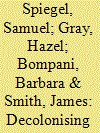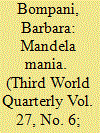| Srl | Item |
| 1 |
ID:
151497


|
|
|
|
|
| Summary/Abstract |
Academics in high-income countries are increasingly launching development studies programmes through online distance learning to engage practitioner-students in low-income countries. Are such initiatives providing opportunities to critically tackle social injustice, or merely ‘mirroring’ relations of global inequality and re-entrenching imperial practices? Building on recent scholarship addressing efforts to ‘decolonise development studies’ and the complex power dynamics they encounter, we reflect on this question by analysing experiences of faculty and students in a United Kingdom-based online development studies programme, focusing particularly on perspectives of development practitioner-students working from Africa. We discuss barriers to social inclusivity – including the politics of language – that shaped participation dynamics in the programme as well as debates regarding critical development course content, rethinking possibilities for bridging counter-hegemonic development scholarship with practice-oriented approaches in a range of social contexts. Our analysis unpacks key tensions in addressing intertwined institutional and pedagogic dilemmas for an agenda towards decolonising online development studies, positioning decolonisation as a necessarily unsettling and contested process that calls for greater self-reflexivity.
|
|
|
|
|
|
|
|
|
|
|
|
|
|
|
|
| 2 |
ID:
074916


|
|
|
|
|
| Publication |
2006.
|
| Summary/Abstract |
This paper investigates the public role of mainline churches in post-apartheid South Africa and their interaction with the political discourse. The action of churches in the public sphere in the 1990s has been commonly defined as ‘critical solidarity’ and their voice was of support and alignment with the African National Congress (anc) position in the process of nation building. Through an analysis of political and religious discourse this paper aims to demonstrate that it is possible to identify a shift in the churches' action in the past five years, passing from a position of alignment and non-confrontation with the government to a situation of disengagement and critical opposition. This reshaped relationship highlights the internal and external difficulties of the anc in shifting from liberation to democracy. This is underscored by the generation of rhetoric and myth that preclude critical spaces, asserting the inalienable right of the anc to produce all political discourses.
|
|
|
|
|
|
|
|
|
|
|
|
|
|
|
|
| 3 |
ID:
191843


|
|
|
|
|
| Summary/Abstract |
Much attention has been paid to the growth of Pentecostal-charismatic Christianity in Uganda and the way it has shifted over the past decades from being a minority religion to influencing and shaping the Ugandan public and political spheres. Most of the literature, however, associates the Pentecostal-charismatic dynamic public action with its motivation to promote conservative Christian values, especially around issues of sexuality, HIV/AIDS, reproduction and family values. This article extends this literature by providing a fuller explanation for the reasons behind its public transformation and its relation to power, in particular its loyalty to and support for President Museveni. Drawing on participant observation and interviews conducted over several years, this article argues that along with theological and moral explanations, it is important to understand how local and contextual dynamics interplay. Indeed, the uncertainties and memories of the difficult origins of the Pentecostal-charismatic movement and the lack of legal recognition as fully registered churches, still impact on the present and motivate them to be catalytic socio-political actors in need of forging strong connections with centres of power in Museveni's Uganda.
|
|
|
|
|
|
|
|
|
|
|
|
|
|
|
|